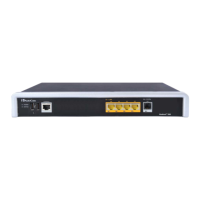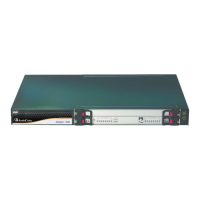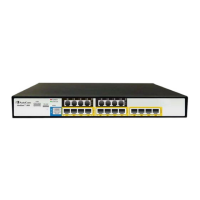Version 7.2 1017 Mediant 500L Gateway & E-SBC
User's Manual 69. Configuration Parameters Reference
Parameter Description
http-user-agent
[AupdHttpUserAgent]
Defines the information sent in the HTTP User-Agent header in the
HTTP Get requests sent by the device to the provisioning server for
the Automatic Update mechanism.
The valid value is a string of up to 511 characters. The information
can include any user-defined string or the following string variable
tags (case-sensitive):
<NAME>: product name, according to the installed License Key
<MAC>: device's MAC address
<VER>: software version currently installed on the device, e.g.,
"7.00.200.001"
<CONF>: configuration version, as configured by the ini file
parameter, INIFileVersion or CLI command, configuration-version
The device automatically populates these tag variables with actual
values in the sent header. By default, the device sends the following
in the User-Agent header:
User-Agent: Mozilla/4.0 (compatible; AudioCodes;
<NAME>;<VER>;<MAC>;<CONF>)
For example, if you set AupdHttpUserAgent = MyWorld-
<NAME>;<VER>(<MAC>), the device sends the following User-
header:
User-Agent: MyWorld-
Mediant;7.00.200.001(00908F1DD0D3)
Note:
The variable tags are case-sensitive.
If you configure the parameter with the <CONF> variable tag, you
must reset the device with a save-to-flash for your settings to take
effect.
The tags can be defined in any order.
The tags must be defined adjacent to one another (i.e., no
spaces).
auto-firmware
[AutoCmpFileUrl]
Defines the filename and path (URL) to the provisioning server from
where the software file (.cmp) can be downloaded, based on
timestamp for the Automatic Updated mechanism.
The valid value is an IP address in dotted-decimal notation or an
FQDN.
aupd-verify-cert
[AUPDVerifyCertificates]
Determines whether the Automatic Update mechanism verifies the
TLS certificate received from the provisioning server when the
connection is HTTPS.
[0] = Disable (default)
[1] = Enables TLS certificate verification when the connection with
the provisioning server is based on HTTPS. The device verifies
the authentication of the certificate received from the provisioning
server. The device authenticates the certificate against its trusted
root certificate store (see ''Configuring SSL/TLS Certificates'' on
page 113) and if ok, allows communication with the provisioning
server. If authentication fails, the device denies communication
(i.e., handshake fails).
[AUPDDigestUsername] Defines the username for digest (MD5 cryptographic hashing) access
authentication with the HTTP server used for the Automatic Update

